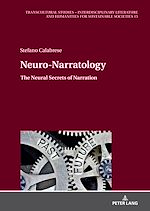
Neuro-Narratology
Costantino Maeder, Dagmar Reichardt, Rotraud von Kulessa
Editeur: Peter Lang GmbH, Internationaler Verlag der Wissenschaften
44,90 €
What happens in our brain when we create a story? Based on neuro-cognitivism, the study of narratives – ranging from novels to “life-stories”, which relate to interstitial topics – has become more rigorous. In fact, an unparalleled panorama of constants, cemented since the Upper Palaeolithic, has been added to an unprecedented awareness of how each cultural habitat shapes the narratives of its inhabitants. This occured according to a particular neuro-cognitive style, thus limiting the so-called “authorial” freedom. Narratives – whether they originate from the Muses or from the voice of a completely illiterate individual – are like compressors that can zip together all the most crucial elements in our existence: time, space, intentions, purposes, agents and instrumental actions. For this reason, they represent an inexhaustible object of research.